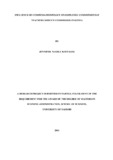| dc.description.abstract | The realization of organizational objectives is in most cases achieved through the human resource asset and there is need therefore to enhance the commitment of employees to the organization. Hence identification of all possible factors that increase employee commitment is of utter importance. Indeed the compensation policy is an important element of human resource management. It influences decision of potential employee to join an organization and determines employer-employee relationship after employee joins the organization. The compensation policy should in addition encompass both monetary and non-monetary rewards paid to employee in exchange of the services rendered while taking into consideration employment contract, competence and skills. This study aimed at establishing the influence of compensation policy on employee commitment at Teachers Service Commission, Kenya. Primary data was collected usingself-administered questionnaire and the data was analyzed by use descriptive statistics specification and regression analysis. The data was presented using table and pie charts. The study established that TSC had different forms of compensation that compares with other state bodies and that the management involves junior staff in decision relating to their pay. There is diversity of compensation at TSC and this attracts different types of employees. Generally, the study found that cash pay for performance policy was the popular compensation. It was also established that the compensation policy influences employee commitment and this led to enhanced performance, trust in management and strong relationship in the organization. Further, the cash rewards were reflective of individual skills and effort which included allowances for extra duties and responsibilities. The employees’ compensation included pension schemes; personal security through illness, health or accident insurance covers; safety in work environment, financial assistance for loans in house purchase schemes or purchase of organizational products and work life. The regression model adopted by this study was found to account for 85.4% of the variability in the data. Herein, a significant F-test value was obtained. This shows that there was significant relationship between gross pay and employee commitment .From the findings obtained, it recommends that there is need for top leadership in the organization to establish an effective employee compensation since this would influence the success of attaining the objectives and vision of the organization. In addition, compensation of employees at TSC should be based on performance considerations in order to enhance employee commitment. The following research directions are recommended. Therefore the need for comparative studies to be carried out in other sectors, such as manufacturing and service sectors. Since this study consisted of only one antecedent (compensation policy) on employee commitment, other antecedents, such as job satisfaction, role conflict, role ambiguity or centralization of authority which have been shown to be related to organizational commitment should be included in further studies. | en_US |



